James Funfer's Blog
November 22, 2018
Do Not Piss Off the Dungeon Master
Do Not Piss Off The Dungeon Master. That’s the mantra. I saw it on a t-shirt as I was scrolling through Amazon looking at Dungeons & Dragons-themed gifts. The message of the shirt is clear: if you push too hard in a roleplaying game, something bad will happen to your character. It’s a form of punishment; a threat if you don’t abide by the DM’s (Dungeon Master’s) wishes. If you derail the story. If you kill an important NPC (non-player character).
There’s more than a hint of the adversarial in the statement, as though the DM and the players are somehow diametrically opposed. Brave heroes attempt to succeed against a world designed to destroy them. I stumbled across other t-shirts bearing similar slogans, and a theme arose: the storyteller working against the players is hard-baked into roleplaying culture.
This offends me for several reasons. You have pissed off the Dungeon Master.
First and foremost, roleplaying is a game of collaboration. If you want to play in a vacuum, where events happen that your players have no control over, you might as well download RPG Maker, create your story, and play it yourself. Alone.
You might as well masturbate in the dark for hours if that’s the value you see in your players.
An inexperienced Dungeon Master may build a story based on predestination: I had this really cool scene play out in my head and I want to describe it to my friends. This will often involve an overpowered, favoured NPC, because the DM knows that they can fully control what happens and the choices that character makes.
The problem is one of agency. When events unfold without the players’ involvement or intervention, it’s back to the masturbation thing. You had an idea in your head and you wanted it to happen this way. The story has to unfold this way. I want spectators to the glory of the story and world I’ve made.
But a player is the opposite of a spectator. They’re not on the stands; they’re in the ring. They are and should always be (with exceptions for things like exposition) the focus.
This seems patently obvious, right? Yes, we all know that D&D is about the players. Then why the popular t-shirts warning you not to piss off your DM? Every roleplayer laughs; we all get the joke. So what perpetuates this perception of the controlling, spiteful DM?
Here’s a classic example of what I’m talking about. In this real-life scenario, the DM seems more concerned with the story in their head than they are with the story that the players are trying to build for themselves by experiencing it. Any attempt to influence events is met with smackdown-levels of control.
But James, you may ask: how can I tell a great story if my characters are derailing things all the time with their wacky schemes and petty interests?
Roleplaying games are a compact between the players and their storyteller. It’s give and take; it’s a transaction of sorts. When we pay money to see a film, we expect to be entertained. If we weren’t, we perhaps lose faith in the director. Or producer. Eventually, if we see enough terrible movies, we may lose faith in filmmakers in general.
If your players aren’t following your plot, there are a few questions you need to ask:
Am I telling a story the players care about? This should lead you back to the initial discussion you had with your players when they were creating their characters. If you didn’t have such a conversation, to assess each character’s motivations, desires, and general personality, it’s never too late to start. Not only does this allow the player to understand your world ahead of time by building their place in it, they will offer cues as to what they’re after (Sidenote – the new D&D 5th Edition DM’s Guide has a great section about the different types of roleplayers and how to cater to their interests). You should still get excited about the world you’re building, but you’re building it for the players, too. You know all the ins and outs. Your players get to live it out. In other words, their backstories and motivations should be a part of your metaplot.
What are the players interested in? Your players will make unexpected choices, and you never know what will catch their attention. I’ve had players steal museum artifacts, shoot key NPCs, and generally force me to create whole groups of characters who eventually became important to the story. And I’m grateful for it – the players know their actions matter. You may have to learn to think on the fly (this is the challenging part for hardcore planners) and you may have to take ten minutes in the middle of a gaming session to re-think how something will play out. Here’s the best part, though – your game is a story, and one of the most satisfying aspects is a player’s thrill and surprise at an outcome. When you allow a story to go to unexpected places, those unexplored parts of your world you didn’t have time to colour in or sketch out fully, you get to be surprised and delighted too.
Am I giving the players agency? This is perhaps the most important part of player satisfaction in an RPG. A player should always feel like their actions matter. Don’t feel like you need to “police” the group, to protect them from mistakes, or to protect a ‘plot point’ that you feel is important to the overall story. If a villain dies before they were ‘supposed to’, let it happen. If a player screws up, let them. Consequences to disastrous actions may follow, and your player will learn (or not). The world itself is punishing. That is why there are rules and challenges. Let the dice (I.E. fate) decide the outcome. You can be a ‘true neutral’ GM like Abed,
 or somewhere on the helpful/merciful scale when it comes to character death, but whether or not you are protecting your players, their actions should have consequences that you can use to advance a story.
or somewhere on the helpful/merciful scale when it comes to character death, but whether or not you are protecting your players, their actions should have consequences that you can use to advance a story.Matt Mercer of Critical Role sums it up pretty succinctly.
Cut back to sassy t-shirts and coffee mugs. Your DM should not be “out to get” or “punish” you for choices that your character makes. If you feel that they are, you should probably show them the plethora of reddit and stackexchange posts from frustrated players detailing how their DM has failed them (and yes, I know that players can also fail spectacularly at being decent people, contributing to a collective story, or showing basic human decency – but their side of the compact is a topic for another time).
Everyone gets the joke: “Do Not Piss Off The Dungeon Master”. The subtext? The Dungeon Master is an adversary who is out to get the players. Let’s change the narrative. “Respect your Dungeon Master”. When they respect you, too, and the choices you make in the game, that’s where the real magic happens.
January 10, 2017
Doom’s Daughter, Chapter 6
“Many years before any of you were born, the world was filled with humans.”
The bonfire crackles, and in its glow I survey the faces of the bright-eyed Kawitzen children, listening intently to Amelia’s story. Although the winter is mild on the west coast of North America’s 49th parallel, it still gets damp and chilly at night.
“They spread out from their home in Africa and covered the planet, until there was no place you could not find them, not even the frozen lands of the north and south poles.”
The ratio of kids to adults is off-kilter in the Kawitzen tribe, just like most places we visit. Echoes of The Doom are still felt here. Survivors looking to be fruitful and multiply still have to come to grips with the horrors of their offspring not always inheriting their immunity.
“But these children of the Goddess did not simply spread and multiply. For in their wake they brought with them what they called civilization. And what is civilization?”
As a bunch of chubby little hands shoot into the air I roll my eyes and look at Father. If I wanted something this heavy-handed I’d read Ayn Rand, my eyes say to him. He’s busy reading something by firelight and doesn’t notice me, but I’m sure he’d have a few choice things to say about The Doom if he wasn’t so intent on being polite to his new girlfriend.
“Civilization is when you think that some people should get more than other people,” a girl says. We’ve found the pedant in the group, folks. “Civilization uses the gifts of the Goddess without giving back to the planet. Civilization made the Goddess send the Doom so that the planet would stop dying.”
Why did I sit here to get an agenda-driven history lesson instead of going off with the other teenagers? I ask myself. You wanted to meet new people, Regan. Congrats. Eight brainwashed thumb-suckers and the Queen of the Hippies.
I remind myself that I’m trying to avoid Mason. I’m still shocked they let him back in the tribe despite his constant need to betray everything – up to and including his own dignity – but then again, the Kawitzen seem to have forgiveness down to Jesus-like proportions. Most post-Doom village cults are a danger to others; this one seems to be more of a danger to itself.
“That’s right Harmony,” Amelia says, bringing my focus back to the present. What’s going on? I ask myself. Oh, yeah. Back-patting for taking the blue pill. I accidentally laugh out loud at my secret Matrix joke that nobody would get.
“Is something funny, Regan?” Amelia asks. It’s creepy because she doesn’t sound offended.
“It’s nothing,” I mutter. “Please carry on.”
“No, please,” she insists. “You and your father are well-travelled. Do you have further insight into the fall of civilization?”
I sigh, looking to Father pleadingly for support but he’s still reading his book. A lifetime of knowing his habits tells me that he’s actually listening, but he’s not going to back me up on this one.
I sigh. “You were born well before The Doom, right Amelia?”
She smiles. “Guilty; I’m no spring chicken.”
“So you remember that The Doom was a human-made virus, right? Not some book of revelations or Gaia hypothesis plague?”
Amelia regards me calmly but there is something new in her eyes. That’s right, I think. This road scholar knows better than your spoon-fed, homespun religion, and you have to respect that, don’t you?
“According to the mainstream media at the time, yes. Sources proven to be less than credible.”
The kids’ faces turn from left to right and back again like they’re watching tennis.
“Um, and according to him,” I say, pointing at Father. “Your saviour-guy. And more than a few well-documented sources. And…”
Father slams his book shut so loudly that it is heard over the crackle of flames, over our argument. He stands and gives me the you-know-what-you-did stare, except I have no idea what I did.
“Can I talk to you for a moment, daughter of mine?”
I stare at him from across the flames. “Sure.” I grit my teeth. “Dad. Of mine.”
As we leave the area around the bonfire I catch Amelia’s eye. She’s got this look like: ‘how would you know about The Doom, Regan? You weren’t born yet’. I just want to punch her, but I don’t generally throw fists around when I’m a guest.
I have punched one of Father’s girlfriends before, though.
Father stops walking when we’re hidden deep in one of the rows of the Kawitzen’s winter garden.
“What do you think you’re doing?” he asks.
“Right now? Being admonished for inscrutable reasons, apparently.”
“You’re not going to change their minds, Regan.”
I fold my arms, staring up at the cloudy night sky so I don’t have to look at his stupid accusatory face.
“I cannot believe you’re not backing me up on this, Dad. I mean…goddess plagues? Civilization pared down to a concept that a five-year-old thinks it can understand? Hey, we’ve seen our fair share of cults, but…”
“But nothing,” he counters. “They’re peaceful. You wanted to trade with them and meet new people. Well, here we are. Everyone gets to decide how they rebuild the world. This is how the Kawitzen are doing it, and I’d say they’re not doing too bad of a job.”
“Doesn’t the truth matter?” I raise my voice with the hope that someone will eavesdrop and learn something. “Or are you too busy trying to impress your new girlfriend?”
“She’s not,” he says, laughing, “my girlfriend. Civilization was a monster, Regan. You might think you understand what it was, and perhaps you do better than most who remember it, but really it was a juggernaut of destruction. It was the selfish soul of humanity, the manifestation of our biological instincts dressed up in the trappings of fairness and progress. It was leading us toward ecological disaster. It was an arbitrary system of numbers that gave incredible power to a select few and essentially enslaved the rest. It was the pursuit of knowledge above all else which brought us to The Doom.”
“But…”
“Don’t interrupt. Their goddess is a metaphor, yes, but these people are trying to teach their children not to make the same mistakes we did, so I’d say it’s a step in the right direction. Because the hard truth of the matter, Regan, is that if The Doom hadn’t come to the world, we would have destroyed it anyway, with nuclear warheads or the greenhouse effect or oceans full of garbage.”
“Okay,” I say. “Thanks for not being an asshole about it, Dad. So you’re saying The Doom was a good thing, now?”
He gets that quiet, contemplative face like he does sometimes when The Doom gets brought up. Like he’s remembering horrific things that, to this day, he won’t tell me about. Bodies piled in the streets and burning cities and wanton violence kind of stuff.
Then we hear the sound of a fire hall siren.
“It’s the League!” someone shouts in the distance. “Get to the towers!”
“Really starting to hate this League,” I mutter to Father as we race back to the RV for some firepower.
“Tell me about it,” he says.
January 3, 2017
Doom’s Daughter, Chapter 5
The man in the woollen cap raises his rifle. Knowing Father, he’s got the pistol in his duster pocket pointed at the guy. Mason is on the floor, still pleading silently with his stupid, snotty face. I’ve got my shotgun in my hands, hidden just out of sight. It’s not so much a Mexican standoff as a two-on-one with an extra army outside for the outnumbered guy.
“Ok, what’s going on here?” Wool-cap demands.
“Just calm down, my friend,” Father says in his best negotiation voice. It’s the voice that always gets the best bartering price on goods. It’s the voice that talked Reverend Jones down from burning me at the stake. It’s the voice that…admittedly, didn’t work so well against the angry bikers in Sin City, but that’s a different story. I still can’t believe Father brought me along that time.
“I’m calm, I’m calm,” Woolly says. “Just wondering why you have a guy tied…oh, it’s Mason.” He lowers his rifle. “Thought some off-islanders’d be an easy mark, eh, kid?”
“Cale, they’re crazy, ya gotta help me,” Mason bleats. I watch with satisfaction as Cale rolls his eyes.
“Don’t listen to a word he says,” Cale advises. “He’s slippery as soap, can’t be trusted. Does dirty work for the League, besides.”
“Yeah, about that,” Father says, scratching the back of his neck as he lets go of the gun in his pocket, “I’d like to know more about the League. And your tribe.”
Cale nods, smiling broadly as he takes a gander about the RV. “Well I’d say you’ve got extra stuff to trade. Tell you what: why don’t you follow us back to the village? I can introduce you to our priestess, er, leader, and we can trade goods and information.”
“It’s a trap!” Mason shouts.
“Dad, can we gag him?” I ask. Guy changes tunes more than I do when I’m checking out a scavenged mix-CD.
***
We turn around, heading north, following Cale and his crew up the highway. A part of me hopes we’ll run into Mason’s ‘friends’ along the way, but the journey proves to be violence-free, with the exception of Mason straining his wrists to bleeding against his bonds and then whining about it.
Father still doesn’t let me gag him, even after I crank Nightwish to drown out his blubbering. No, make that boogering. I’m sure Father wants to see what else Jar-of-snot will reveal about the League, but I just can’t take it anymore. Epic Norwegian Metal is the only possible reprieve.
The caravan leads us into a literal village. It’s not one of those sad ragged-tents-and-goats outfits, either. It’s a cleaned-up pre-Doom suburbia with a great big farm in the middle which I’m betting was once a soccer field. Mason starts freaking out again, screaming that they’re going to ‘tie him to the maypole and leave him for the crows’ and that if we get out of the RV we’re probably dead, too, but I just ignore him. I know an ambush when I see one.
The roadblock was a possible ambush. This place is kids running around with wooden swords and aluminum foil armour, playing some make-believe game about the good ol’ days when the scariest disease out there was the bubonic plague. This village is farmers in hand-sewn work-clothes tending to vegetable crops, standing up to wave at their returning scouts, or army or whatever they happen to be.
This place is, I’m betting Father will mutter any minute, ‘Hippie-ville’.
“Oh, it’s a hippie commune,” Father exclaims from the passenger seat, leaving out the ‘ville’. “They’d be more likely to try and put you on a vegan diet to suppress that aggression, Mason, rather than kill you.”
“Uh-huh,” he sniffles, “and their guns are just for show.”
I’m betting the guns are for protection, but I decide to wait and see what the locals say about Mason and the League. Appearances can be deceiving, especially when it comes to local leadership.
Cale and company park outside of what looks like an English-style pub. Minus our truck, we only take up five parking spots. Everybody clambers out and Father hands Mason over to the Kawitzen, despite his screaming protestations.
“Mason’s back!” one of the tin-foil knights exclaims, and suddenly they’ve surrounded him, chanting and taunting him with their weapons. Surprisingly, the children seem to calm him down. I hang back and watch as Father chats with Cale.
“We captured you again,” the tallest boy exclaims, prodding Mason with his sword-stick.
“The only thing you’ve ever caught was the permanent stink of farts,” Mason retorts. The children giggle. “Those strangers captured me,” he says, gesturing his head in my direction, “and you’d better keep away from them. They’re from the mainland and don’t believe in the Goddess. They’d probably sell you all into slavery if they got the chance.”
I raise an eyebrow as the children scream and scatter. The tall boy with the sword glares at me like he’s about to have a moment of bravery, until I wink at him. He and his courage flee the parking lot.
“Well you got one thing right,” I tell Liar-Pants Mason. “I don’t believe in your stupid goddess who definitely doesn’t exist and is just a figment of a small-village post-Doom imagination, probably meant to help explain…”
“Regan,” Father says. “Let’s go.” He gestures for me to follow him and Cale. Mason is led away by another member of the scouts, to some unknown fate. Based on the fact that he’s no longer stuck on ‘I’m gonna die’ like a warped vinyl record, I assume that he’s pretty well-known to the Kawitzen, and that they don’t generally execute people.
He seems like one of them, I think. I want to ask Cale about it, but he and Father are talking in hushed voices. We head into the vegetable field.
“Where are we going?” I ask them. “Or is that information as secret as the rest of your conversation?”
“We’re just talking shop, Regan,” Father explains. “Not everyone around here appears interested in the finer aspects of gun collection and maintenance.”
“No, they appear interested in vegetable collection and maintenance,” I reply. “Hey, hat-guy. Did you know that you’re named after a vegetable?”
“My name is with a ‘c’,” he says, deadpan. “And it’s called a toque.”
I blink. “You just made that word up.”
We reach what I can only describe as a palatial yurt in the middle of the field. I’d been hoping to see Wizard of Oz-style guards chanting Oh-ee-oh or maybe two sun-bronzed dudes fanning some lady on a lounge chair out front, but no such luck. Clearly the Kawitzen are comfortable breaking all the rules of post-apocalyptic tribal hierarchies.
“Amelia?” Cale calls into the dark recesses of the tent. “Are you in?”
The woman who emerges can only be described as ‘granola-chic’. Her wavy silver hair is almost a mantle. She’s wearing a wrap-style skirt and hemp tunic, very down-to-earth, but her fingers are covered in more gold and silver than I’ve seen outside of a cracked safe. She’s got this big banged-copper medallion around her neck with an ensconced amethyst, in the shape of a crescent moon. She glances at Cale for just a second before fixing her eyes on Father.
“By the Goddess,” she says, stepping forward and cupping Father’s face with both hands. “Our saviour has come.”
“I think she likes you Dad,” I point out.
December 5, 2016
Doom’s Daughter, Chapter 4
My urge to punch Mason fades, along with my urge to do anything else to him: kiss, admonish for breaking my CDs, teach to be less shitty. Instead I just feel a mild mixture of pity, revulsion and curiosity. How could someone so initially attractive be such a wussy jerk? I decide that there is only one way to find out.
“So what made you decide to be such a wussy jerk?” I ask as I turn another corner on the cracked and debris-filled road. Mason shifts away from me, trying to hide his look of shame.
“Keep your eyes on the treeline,” Father tells me. “For more of those League bastards.”
“Roger,” I reply as Father clambers into the back with Mason’s rifle. He looks like he’s going to tweak it some more. “Hey. Masonjar. I’m talking to you.”
“I told you I was going to die and you don’t even care.”
“Wow, I asked you a question and you didn’t even answer. You are currently alive. So, following normal logic, you don’t know for certain how and when you are going to die. And why should I care? You tried to trick, ambush and kill both of us. It doesn’t exactly create a feeling of loyalty.”
Past the abandoned rural houses, the road returns to the highway. I take it south, back to the big city at the bottom end of the island. We pass dilapidated gas stations and rusted-out cars as we go.
“I wasn’t going to kill you,” Mason insists.
“Oh, so you were bluffing? You were going to let your friends do the dirty work? Wow, you’re just making yourself sound better and better, Jar-head.”
“You think I had a choice?” Mason’s face explodes into a fresh display of mucous, spittle and tears. Oh, very sexy, I think. “I try to leave, they’ll kill me. I try to warn anyone, they’ll kill me. I was going to try and tell you, but then you…”
“Let me stop you right there,” I interrupt him. “First of all: if you want somebody’s help, pointing a gun at them? Probably the worst way to ask for it. Sounds like your employers, uh…sounds like you need to change your…hmm…” I stumble over my words. “Hey, Dad? Help me out here. I’m not good with job-related idioms.”
“Sounds like you should take out employment insurance,” Father quips from the back.
“Ha!” I say. Mason isn’t laughing, however. He’s just leaking out every hole in his face some more. “…Dad, what do you mean by insurance?” Sometimes his pre-Doom terms go over my head. “Never mind,” I say, turning my attention back to Mason. “You always have a choice. Unless you want to talk determinism.” Mason looks at me like I’m speaking an alien language. “Determinism. Cause and effect. The belief that…” I suddenly remember that not everybody stockpiles books and data, and the literacy rate has dropped pretty sharply in some areas, post-Doom.
As I glance back at the road, the rest of the sentence dies in my throat.
“Dad?” I call out. “Code thirty-three. Point two.”
“Roadblock? Are they armed?”
Even at a hundred metres, I can clearly see the firearms they carry. A dozen women and men span the highway ahead, carrying automatic rifles. One of them appears to be brandishing grenades. Behind them is a row of vehicles, blocking the way south.
“Oh yeah.”
“Shit,” Father says. “Turn around.”
“Fuck, I’m gonna die,” Mason exclaims as I slam on the breaks and start spinning the wheel. I haven’t tipped Charlotte over yet, but it feels like I’m going to, every time I pull this manoeuvre.
“There’s no way your so called ‘buddies’ know you’ve semi-not-really-betrayed them already,” I say through gritted teeth as the brakes screech. “Are you telling me your League made a roadblock?”
“No,” Mason wails. “It’s the Kawitzen.” He can’t see through the window from where he’s tied up, but he sounds pretty certain.
“Oh,” I mutter. Charlotte careens on two tires, just for a moment, before plopping back down. Anything not lashed down clatters around on the floor of the RV. “They won’t shoot at us, will they?” I ask Mason.
“They will if they think you’re League,” Mason insists.
“Dad, we’re going to negotiate,” I call out.
“What? No we’re not. ”
“Yes we are.” I start turning Charlotte around again.
“No we’re not!” Mason shouts.
“Too late,” I say, flipping the loudspeaker switch before Father can stop me.
“PEOPLE OF THE KAWITZEN TRIBE,” I say, loving the way my voice booms. “WE COME TO YOU IN PEACE. WE ARE NOT FROM THE LEAGUE.” I hit the brakes and come to a stop some thirty metres away from the road block, hoping that the tribe won’t open fire.
Their shocked expressions are so great that I find myself wishing I’d brought my camera up to the cockpit. Dad is beside me suddenly, staring out the window at the assembled row of armed people in their piecemeal clothing.
“I said no,” he mutters. I can tell by his expression that the admonishment is mostly an afterthought; Father is already calculating new plans in his head based on possible outcomes of my rash decision. Admittedly, it’s not the first time something like this has happened. I think he’s getting used to it.
A man with a woollen cap and salt-and-pepper beard approaches Charlotte while the other tribals keep their weapons at the ready. The guy with the grenades looks anxiously from the explosive in his hand to our vehicle, perhaps realizing that he’s a bit too close for his weapon to be a good idea. Dejected, he lowers his arm and his expression goes from zealous to impatiently wary.
The man reaches Charlotte and – I can hardly believe it – actually knocks on the door. I can’t help but laugh. Father doesn’t think it’s so funny. He signals for me to remain at the wheel and he goes to meet the man at the side door.
“Alright, buddy, no funny business!” I hear the man say through the door. I look at Mason.
“What does ‘buddy’ mean?”
“Like a friend.”
“But they don’t even know each other!”
I’ve missed a part of the conversation, but I hear the door of the RV open and the man step inside.
“Welcome to my home,” Father says. “We’ve got a…”
“Help!” Mason cries, leaning over from his tied-up spot by the chair. He gives the man with the cap his best pleading expression. “These people are going to kill me!”
November 29, 2016
Doom’s Daughter, Chapter 3
“…guy?” I venture. The door has been left wide open, but our guest is nowhere to be seen. Thankfully, he didn’t steal any of my CDs. “What a jerk,” I mutter. “I told you we’d scare him off, dad.”
“Did he steal something?” Dad asks anxiously as he rapidly takes a visual stock of the RV’s contents.
“I don’t…” I am interrupted by gunshots. The telltale ping of ricochets and perforations of the RV’s stainless steel hull reaches my ears.
“Shit,” Father and I both say. Like a spooked spider he’s up the ladder, scanning the area with the periscope. I resume my position against the wall with my shotgun. Father flashes me a series of signals: Two men. Armed. 50 metres east.
Mister Disappearing Act returns, vaulting himself into the RV and slamming the door. “It’s the League!” he wails.
“What are you doing?” I scream. “You’re screwing up the contingency plan!”
“The what? Quick, give me my rifle back, they’re coming!”
“Auugh,” I moan.
“Regan!” Father shouts. “Drive.”
“Toward them, or…?” I ask as I rush up to the cockpit.
“Nobody puts holes in Charlotte,” he says. I chuckle as I start up the vehicle. Dad is back up the ladder, getting ready to unleash precision justice on the League jerks or whoever they are.
I see them down the road, two men with assault rifles. They make for the ditches when Charlotte begins picking up speed, and I thank pre-Doom engineering for bullet-proof glass.
“Sorry boys,” I say. “When you shoot first without asking questions…we shoot back.”
I feel a tug at my belt holster and I tense up. In my right ear I can hear the telltale click of the safety and the mechanical grind of the hammer pulling back.
“You sly asshole,” I say. My knuckles are white on the wheel.
“Those are my friends your dad is about to shoot at,” he says.
“They shot first,” I say, cursing myself for having more wit than sense. Charlotte continues rolling toward the shooters, who have begun firing at us from their entrenched position. “Plus it looks like they’re trying to hit you, too.”
“They know what they’re doing. If you know what’s good for you, you’ll drive exactly where I tell you to drive.”
I can hear my heart thumping in my chest. If Father is aware that something is amiss, he has made no sign. However I haven’t heard any shots from the hatch yet.
“You might put a hole in my head,” I say. “It’s a chance you could take. But seeing as how my hands are on the wheel, when I go, this RV is going to careen out of control and you’ll fly around like a pinball.”
“What’s a…?”
“Plus there’s still this scattergun in my lap. I hear people’s nerves twitch quite a bit when they get their brains blown out.”
“Plus,” I hear Father say behind me, “If you do anything other than put that gun down, you’re dead anyway.”
My sigh of relief and the hum of the engine are the only sounds for a moment. I don’t know how it’s possible to feel shaky when my hands are so tight on the steering wheel. I can see him lower the gun out of the corner of my eye, and I’m expecting to hear Father’s rifle next.
The guy gets the butt of the rifle in the back of the head instead. His face strikes the glass and he falls backward, howling. There is a bloody spot where his nose smashed against the windshield. Then Father lays into him, fists swinging.
“You fucking bastard!” he shouts, his voice at a fever-pitch.
“Dad!” I shout. The road ends in a cul-de-sac, and the other two assailants are still behind us.
“What?” He looks up, fists bloody. Our prisoner is still alive, sobbing again, blood and tears and snot all mixed up on his face.
“We still have two guys with guns out there,” I remind him.
“Right.” The utility cable is out of his pocket in a flash. He ties knots around our prisoner’s wrists, then loops the wire through the passenger seat’s frame, pulling it tight. Meanwhile, I start turning Charlotte around, scanning the road we’d just come down for signs of the other two men. All I can see is the cloud of dust and debris we’ve stirred up.
“What’s the plan, Dad?”
“We go.”
“Umm…the truck?”
“I’m not sticking around for a pointless gunfight, kiddo. We can get a new one in the city.”
“What about Mr. Backstabber over here?”
Father spares a glance at him. He’s breathing through his mouth because his nose is smashed in, staring at us like we’re horrific monsters of some kind.
Lay off it, I think. It’s not like we’d leave you for the wild dogs.
“He stays with us until I get all the information I want out of him.”
I hit the gas. The men are lying in wait in the ditches up ahead. They take another few pot-shots at the RV, to little effect. One of them heroically attempts to run alongside us and make a leaping grab for the door handle, but his attempt fails. I don’t hear the crunch and scream when his leg goes under the back tire, but I imagine it in my head and grin.
“Nice people, the Kawitzen Tribe,” Father remarks as we reach the intersection and turn the corner.
“I’m not with them,” the guy manages to mumble between the bloody froth and spittle in his mouth.
“Who are you with, then?” Father asks. “The League?”
Our young captive stares at the floor, as though he thinks we’re going to torture him or something.
“Hey what’s your name, guy?” I ask.
“Mason,” he says. I’m surprised he actually told me.
“You’re named after the jars? Or like…someone who builds walls?”
Mason doesn’t answer. He’s too busy blubbering again. For a moment, I almost forget that he’s a back-stabbing, CD-crushing gun-thieving liar.
“Cheer up, you’re not going to die,” I tell him.
“Yes I am,” he insists.
Doom’s Daughter, Chapter Two
Father and I have thirty-seven rehearsed contingency plans, everything ranging from wild dog attacks to flash floods to the (extremely) unlikely event that some psycho somewhere found out how to launch and detonate a nuclear missile. Noise outside the RV is something we’ve had to deal with before; nine times out of ten it’s animals sniffing around, but once in a while it’s a human, and they’re unpredictable at the best of times.
Our movements are fluid and practiced as we get into position. Father glides silently up the top-hatch ladder, holding his rifle by the stock. I get the shotgun from under the bed and press myself flat against the wall next to the door.
Father’s custom ‘periscope’ allows him to monitor the outside from just below the hatch. His cameras feed into a screen he has jury-rigged to the ladder.
One man, he signals. Armed. Wait.
Father opens the hatch painstakingly slowly. He greases it regularly but it still groans once in a while. Thankfully, it does not this time. He lifts himself out of the hatch, preparing to get the jump on the man and force him to throw down his weapon.
Except the latch in front of me turns and suddenly the door is swinging outward. I make a clicking sound, slightly masked by the creaking door, but Father doesn’t seem to hear it. I freeze in place, gripping my gun tightly and holding my breath.
A boot enters first: black, worn, work-boot style, caked with mud and dirt. The man that follows is younger than I expect, probably no older than twenty. His muss of sandy-blonde hair is mostly hidden under a dark toque and his cheeks and chin have a dusting of pale stubble. He’s startlingly good-looking, in fact, and as I try to remain invisible against the wall I find myself hoping we don’t have to kill him. I’m betting his Winchester is loaded.
“The fuck is all this?” he whispers as he gazes around at our abode. His accent is funny and I have to stifle a giggle.
Focus, Regan¸ I think. Check his gear.
He’s surprisingly bundled up, given the mild weather. I see no signs of Kevlar or other armour, but he does have a backpack and a large hunting knife at his belt.
He walks right by me, straight for the CDs I left on my bed.
“Hey!” I blurt out. Shit. As he wheels around I panic, dropping to the floor and kicking his legs out from under him. He falls softly upon the mattress, but I cringe as I hear an unwelcomed crunch of plastic from beneath him. He’s startled, either by the sound or from me tripping him, and his gun goes off.
Whoops, I think. I check my vitals. No holes. It looks like he poked a hole in the ceiling.
“Dad?” I shout as I kick the rifle out of the man’s hands. “Don’t fucking move!” I bark, aiming my shotgun barrel at his midsection. “And get off my CDs!”
“Which one?” he asks urgently. “Don’t move or get off your CDs?”
“Ugh, just get on the floor and put your hands behind your head.”
“Oh fuck, don’t kill me,” he pleads as he follows my instructions. He begins to sob and I suddenly find him less attractive.
“Regan?” Father comes down the ladder to discover that I already have the situation in hand. “Are you ok?”
“I’ve got this, dad.”
“Where’s his gun?”
“Over there,” the guy points to the shelves.
“Don’t you move a muscle,” Father tells him as he picks up the Winchester. “That hole you put in my roof was inches away from being a hole in my dick.” He inspects the weapon. “Except that you need to take better care of your weapons, kid. What kind of amateur scavenger bullshit is this?”
“I’m not a scavenger,” he insists. I lower my shotgun and he relaxes a little, bringing an arm down to wipe tears from his eyes. “I’m a hunter.”
“You’re not likely to find a lot of deer in an RV,” Father quips.
“Sorry. I heard strange sounds. Thought I should investigate.”
“Say ‘sorry’ again,” I tell him.
“I really am sorry, I didn’t know that…”
I giggle. Father shoots me a warning glare.
“What?” the guy asks.
“You say ‘sorry’ weird…I thought it was funny.”
“Any more of you around here?” Father asks. He’s lowered his guard but I can tell he’s still got an eye trained on our captive. He walks over to the crates and grabs his cleaning supplies.
The guy fixes Father with a wary stare. “Where are you from?”
“Nowhere close to here.” Father checks the rifle chamber to ensure it is empty, then begins cleaning the weapon.
“So you’re…not with the League?”
“What’s the League?” Father doesn’t look up from his work.
The man glances at me, looking for a reaction, perhaps, but I shrug.
“You really don’t know about the League?” he decides to sit up. I have my gun pointed to the floor but I refuse to let my guard down completely. He still has the knife.
“Is it a group I should be worried about?”
“Yes. We’ve been fighting them for years.”
“Who’s ‘we’?” I ask.
“The Kawitzen Tribe.”
Father and I glance at each other. This time we both shrug.
“Does your tribe…trade?” I venture.
“Of course we do.”
“Regan,” Father says, a tone of warning present in his voice.
“What?”
“I don’t think so.”
“Why not?”
Father glances at the man on the floor. “This is not the time to discuss such things.”
“Fine,” I say. I look at our guest. “Would you excuse us for a minute, please? Oh, and don’t touch anything if you want to live. Especially my CDs. And you probably shouldn’t sneak off if you want your rifle back.” I glare at Father and signal the words cockpit, talk, please.
Father is the master of the long-suffering sigh. He follows me to the cab of the RV.
“Tell me, dad, what’s the point of scavenging if we don’t trade with anyone?”
“Knowledge and survival. Besides, we do trade.”
“But never anywhere new.” I throw up my hands. “Never with anyone who could possibly benefit from our knowledge about survival.”
“I’m not getting involved in local warfare, Regan.”
“Nobody’s asking you to!”
He slumps into the driver’s seat and presses a finger and thumb to his temple. “There’s no need to yell.”
“Who cares? That guy probably already thinks we’re crazy.”
“Good. Then we can return to the mainland before we run into trouble here.”
“Ugh.” I stare out the window at the fallen-over power lines snaking across the road. “Have you ever considered the fact that I like meeting new people?”
Father is silent for a moment. “I know,” he says. “And I’m sorry you’re stuck on the road with me. When we get back to Novamerica you can…”
“Don’t be stupid,” I interrupt. “I don’t want to stay anywhere. I just…want you to put your trust in strangers once in a while.”
“You can’t trust anybody, Regan. Not even yourself.”
“Very philosophical, dad. Maybe that’s true, but once in a while, maybe it’s enough to trust that someone else isn’t out to kill you.”
“Fine, Regan. We’ll go trade with his tribe.”
I beam at him, but the smile is short-lived. When I glance back to the rear of the RV, the stranger is nowhere to be found.
November 1, 2016
Doom’s Daughter, Chapter One

I think it was a garden once. The wooden frame, like everything in this yard, is overgrown with weeds and brambles. I only found it by stumbling over the lumber with my boot, very nearly falling face-first into a patch of briar thorns. My machete will cut through a lot of things, but I don’t have time to chop up old rose bushes when there’s a whole street of houses to go through. The house is my primary concern, along with the possibility of fruits and vegetables in the back yard.
I hack a path through the weeds and beechwood saplings to trace the border of what I hope is a small box garden. The house is to my right, two stories tall. There is a small glass enclosure attached; I think it might be a kind of greenhouse. It could be promising, but there’s also a good chance that it’s barren. The garden is more likely to yield hidden food.
The frame ends underneath a crabapple tree. Ordinarily such a find would be worth an hour of fruit picking, even if the fruit is tiny and tart, but although the Pacific winter is mild and damp, it’s winter all the same. Any fruit the tree has borne this year has already been picked or is rotten upon the ground, just like the odd pear-shaped fruit at the other end of the yard, brown and soft upon the branch. I don’t think it’s a pear tree though – the ones that I’ve seen, down south, are much bigger when they bear fruit of the same size.
I kneel down and begin sifting through damp weeds and lush grass, thankful for the thick gloves that protect me from rose thorns. Beneath the hardy forest plants, I am rewarded. There are deep green leaves of various shapes, and the soil is still soft despite years of neglect. This rocky island ground, I have discovered, is usually unyielding.
I shrug out of my backpack and grab my trowel from its place in a side compartment. Then I set to work digging, looking for edible roots and stalks. After a few minutes, I have achieved a bit of success. There are small potatoes and a healthy amount of kale. My mouth waters but I restrain myself. The kale will taste better cooked, perhaps with dried berries.
There is a sound in the brush behind me and I realize that I’ve kept my guard down. I wheel around on my haunches and un-sling my rifle in a practiced motion. As I pop the safety off, I stare down the barrel into the placid black eyes of a doe. She munches on leaves, unafraid, though her ears are perked and alert. I am metres away.
I lower the gun. Meat has been plentiful; it’s greens that I need. I don’t have the time to deal with an entire deer carcass, anyway. I let her eat and turn my attention back to the garden. I hear her wander off after a few minutes, and I am again alone in the overgrown yard.
I gather as much as the garden will offer. Not enough to fill my backpack, but enough for at
least a meal or two. The interior of the house promises more unless it has already been thoroughly scavenged, and though I will likely find no foodstuffs, there could be other interesting treasures within.
I check the sky. Grey, dull, threatening to rain as always. It’s impossible to tell the position of the sun, and I haven’t found the right parts to fix my watch yet. There are two more houses on the street to check. Still, there’s enough light for me to decide that I don’t need to hurry just yet.
The back entrance is a sliding door, glass long shattered. The old pieces of glass crunch and pop underfoot, squishing deeper into the moss that has crept well into the carpet of the abode. The glass was probably broken by the earthquake that rocked this area a few years back rather than by looters; many properties had been reduced to little more than ruins, and although some structures survived mainly intact, none were completely undamaged.
I keep my rifle at the ready and step through the threshold.
I quickly survey the walk-out basement and listen for movement. There haven’t been any squatters in the area yet, but I’m not about to let my guard down. There is a kitchen off to my left, cabinets left ajar and empty. Ahead is a living area, complete with computer desks, couch, television and bookshelves.
All useless, except for the bookshelves. I approach with discretion, my eyes and gun barrel fixed on the dark hallway. Nothing stirs. The house is still and silent as a crypt. It could very well be a tomb of sorts, though I have seen no remains yet.
The bookshelves have not been ransacked. It is rare for me to find a place where anything other than food, weapons and basic tools have been looted. I scan the shelves with a tenuous smirk, looking for anything that could pique my interest. It is mostly fiction. I’ve been collecting enough stories to last me quite a while, and I don’t have room on my own bookshelf. The only space I have available is for practical knowledge.
Astrophysics – interesting, but not useful. Computer programming – boring and worthless to me right now. History – well, I’ve had my fill of history for a while. I find no medical texts, no gardening books, nothing about radios or chemistry or guns. I turn away from the bookshelf and head down the hallway. There are three doors – one on each side of me, and one straight ahead. All three are ajar.
The first door is the one on my right. Sure enough, it’s a bedroom, and as expected, it’s occupied. Bedrooms are usually where I find bodies.
To call them corpses, however, is being generous. Usually there’s little remaining but bones. It’s impossible to tell how this one died, but most of the skeletons that I find look as though they were curled up at the end. It suggests either fear or comfort in those final moments. I suspect the former – The Doom was not kind to humanity. I was told that it was terrible in every way conceivable.
The room has little to offer me. The corpse left behind a closet full of clothing for an adult male. The size looks like a good fit, but there is little of practical use that I don’t already own. I check the dresser, delighted to find cargo pants in my waist size in the bottom drawer. I stuff them in my backpack.
The rest of the house has nothing that I need. When I emerge from the front door, the clouds are drizzling. I zip up my hunting jacket and shiver. There are two more houses on the street, but I’m cold and tired and hungry, and it’s wet. I decide to head back home.
It’s a long street, long and lonely in this forgotten part of the world that is slowly returning to the wild. Human habitation is being overtaken. Weeds are sprouting through the many cracks in the asphalt. The blackberry brambles to my right have become a fortress around a standing abode, and I am reminded of the old fairy tale of Sleeping Beauty. With a sense of gloom, I tell myself sternly that the only things sleeping in that house are bugs and bones.
Fields that horses once paced are filled with shoulder-high grasses, where cougars hide and hunt the wild chickens and deer and dogs. Many of the poles once holding power lines have long fallen over, and the wires stretch across the road, innocuous.
I lower my rifle for a moment and shake out some of the damp from my hair. It’s growing past my eyebrows again. I don’t like shaving my head in the winter, but I don’t like how it gets in the way when it’s long. I remind myself that it doesn’t really matter what it looks like, so scissors will work fine.
Home is at the end of the street, hidden behind overgrown hedges in a gravel driveway. As I approach, I make a low whistle, punctuated by a trill at the end.
I wait.
I hear a quork in reply – it sounds like a raven. I round the corner of the hedge. Home is right where I left it. The truck and RV appear to be just another part of the scenery. Abandoned vehicles are just as common as abandoned houses.
Atop the RV, a gaunt figure in a long brown duster sits and smokes a cigarette. His face is shrouded by long silver hair and a tangled mass of salt-and-pepper beard. Across his lap is a scoped rifle. He grins widely at me.
“Hello, daughter,” he says in his rough timbre. “Did you find anything interesting?”
Father perches like a sniper-scarecrow, scanning the street for signs of life or danger as I clamber into the RV, our mobile home and fortress. We’d been using a tank for a while, but that’s another story. Mainly it wasn’t very comfortable, nor did it have a lot of amenities. We sure didn’t get bothered by scavengers when we were rolling, though.
To an untrained eye, our home would seem a mess: shelves overflowing with books and manuals, sketchbooks, journals. These are our lifeblood, our connection to knowledge long forgotten and lost to most. First aid. Hydroponic farming. Engine repair. Chemistry, metallurgy, mycology, electronics. A hunter’s field guide. Farmer’s almanacs. Nautical maps. Digital data is kept separate (if at all): diskettes, CDs, USB data sticks. Most of the ones Father kept were taken from military or government buildings.
Milk crates, each labelled, are lashed to their cubbyholes with bungee cords like security cordons. These are overflowing but meticulously catalogued by Father: wires, nails, screws, tape, string, gauze, cloth, oil, ammo, batteries, paper, pencils. Guns are kept in the safe, tools next to it, in what Father refers to as the ‘cockpit’. Food is kept in the kitchenette, but most of the space is dominated by heat lamps and potted vegetables.
Our survival gear for long forays in the deep wilderness is kept in the truck bed, along with our supply of gasoline. My siphoning skills are such that I have finally forgotten the taste of gas on my tongue.
Next to our beds is the ‘media centre’, which is predominantly a stacked AV system with an amp, tape deck, CD player, record player, speakers and computer. Sometimes I use an auxiliary jack or dock for an old cell phone or MP3 player we find, but once I download what I want onto the hard drive I usually leave these behind. If we took everything we scavenged with us we’d have to have a whole caravan of campers.
Father claims that by pre-Doom standards we ‘bring everything but the kitchen sink’, an adage that I still don’t quite understand because we have a kitchen sink. Given how much there is to claim, how much is lying around, we travel bare bones.
Father climbs in from the roof hatch and sets his rifle down on his bed, the only unclaimed, uncluttered space other than the floor.
“You didn’t answer my question,” he accuses. His tone is lighthearted; this is our first winter spent in a mild climate since I was a little girl, and it has kept him in high spirits.
“If I found anything good?” I lay my backpack down on my own bed and upend its contents, each wrapped in plastic (Forever-Cloth, Father calls it): wild vegetables, cargo pants, a local trail guide.
“That’s it? No rare Rachmaninoff recordings, no floor safes? No sports cars we can take for a spin?”
I shrug. “There was an empty gun case in one house. No signs of recent human tracks or habitation but based on what we’ve seen around here so far I bet there’s a local community somewhere. Supposedly this was good farmland at one point even though it’s a rocky island. Maybe
we should see if we can find them and do some trading.”
Father makes a sour face and gathers the vegetables, placing them in the fridge. “I don’t know…” he trails off. “You never know how the locals are going to react to strangers. Or what they believe…or behave like.”
This again, I think.
“Remember Freetown?” he asks.
“Of course I do.”
“Not so free, was it?”
“Ugh, dad.” I go to the bathroom to try on the cargo pants.
“I’m just saying that sometimes people can be more trouble than they’re worth.” I can hear him clearly through the door. Every scuff and squeak is audible inside the RV; nothing is secret. Don’t even get me started on Father’s snoring.
The pants are a little big around the waist, but that’s what belts are for. What matters is that the pants are durable, with lots of pockets.
“I really don’t relish the idea of running for my life firing a gun over my shoulder again,” he continues.
“That happened once. You can’t assume the worst of every group of people we might chance to encounter just because one town was under the thumb of a psychopath.”
“It’s kept me alive so far.”
I open the bathroom door and glare at him. He’s thumbing through the trail guide in a disinterested fashion.
“If you were so worried about your own safety you would have stayed in Novamerica.” I cross over to my bed and start skimming through my music albums.
“Nice bunch of people,” he muses, “great to trade with, but their ideas about the future of the world…”
I grab a CD and smirk, popping it into the player.
“Have you ever considered the notion that I like meeting new people, dad?”
“Well you’ll just have to deal with some loneliness,” he counters. “If we went around saying hello to every post-Doom settlement we found, we’d be dead seven times over already.”
“Sure.” I press play and Dragonforce starts blaring through the speakers. Father shoots me a baleful look; this is my latest tactic in shutting down conversations and it drives him completely crazy. If he gets to control where we go, I can at least be in charge of how many bullshit reasons I have to listen to.
“Would you shut that off, please?” he shouts. “I wasn’t done.”
“What?” I say, even though can hear him clearly. I accentuate my feigned deafness with some over-the-top air guitar. Father used to join in when I was younger, but around the time I discovered heavy metal he seemed to have unveiled a strong distaste for anything except classical music.
“I said: shut it off. Someone could hear.”
“There’s nobody around for miles, dad,” I insist as the music blares on.
“Regan.”
When he calls me by my first name, I know he’s serious, but I’m too pissed off to want to listen. I crank it up.
He doesn’t shout again or say anything, but dashes over to the amp and shuts the whole system off, pressing a finger to his lips with his other hand.
We have an intricate series of hand signals, he and I, and the gestures he makes with his free hand cause my pulse quicken.
Noise. Outside.
September 10, 2016
Finally, Florence
Although my tour of Italy technically finished with Milan, I didn’t really spend any time downtown or doing any sightseeing (it was more a day of relaxation, wine, and eating), so Florence “capped” the trip.
There is something for everyone in Florence. Foodies, wine aficionados, history-lovers, party people, shoppers, hikers, and explorers can all find what they are looking for in Florence (and its environs, the Tuscany region, as per my most recent blog entry).
Sunday, when I arrived, was the tail-end of the gelato festival, but I decided instead to do some general exploring and spend 5 euros on gelato instead of 30. My hostel was right outside the landmark Duomo which dominates Florence’s skyline, but the square around the church was quite crowded. I found myself a restaurant, parked myself for the evening, and settled in for people-watching, atmosphere, and fiction writing.
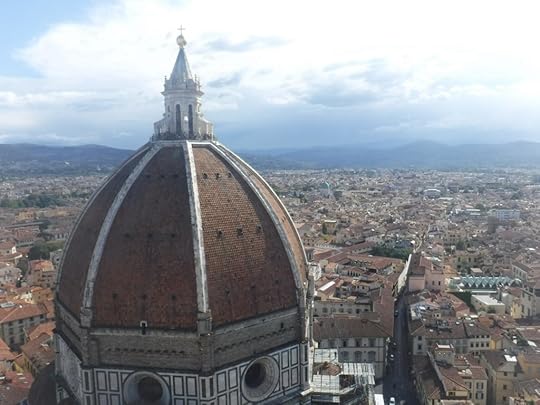
View of the Duomo from the nearby Campanile.
The following day was the Tuscany Tour.
On day 3, my goal was to get my fill of museums in since I’d missed out on several throughout my trip (both the Slovak National Museum in Bratislava and the National Gallery in Prague). I started with the Galleria dell’Accademia, right down the street from my hostel (in the opposite direction from the duomo).
The Accademia is famous for housing Michaelangelo’s David, and although I was initially skeptical, David really was a breathtaking and flawless sculpture. I got in line early (before they opened) and managed to be admitted before the crowds truly pressed in.

The remainder of the Accademia gallery was dominated by pre-masters religious art, a roped-off room of sculptures and busts, and an interesting exhibit about a Medici duke who maintained a court of musicians. The musical exhibit included a beautiful collection of musical instruments from the period, including harpsichords, early pianos, and a Stradivarius violin.

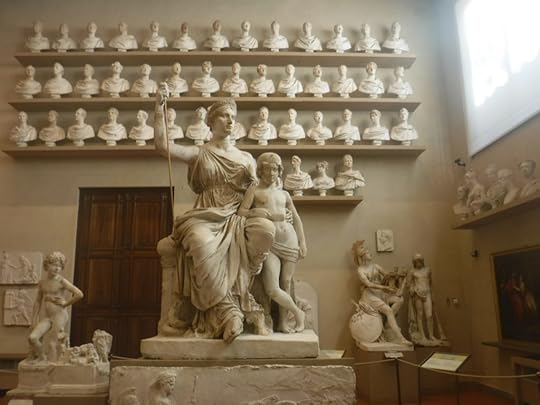
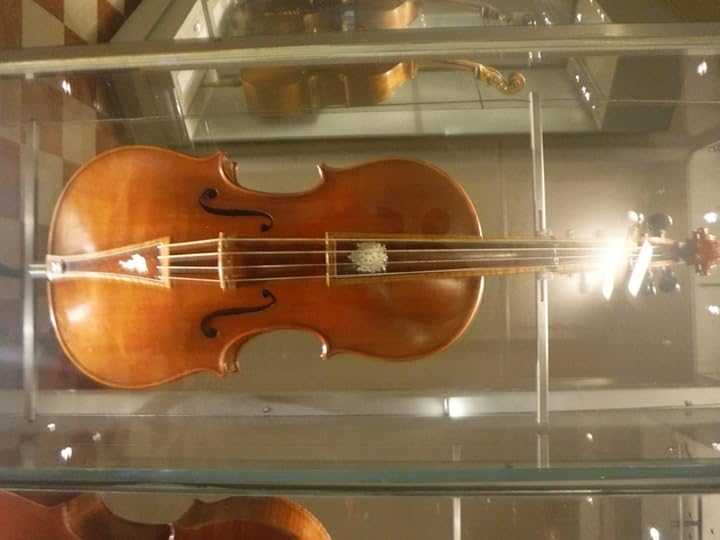
From the Accademia, I climbed the Campanile to get my bird’s-eye views of Florence. There were quite a few steps — I was glad I didn’t have my backpack on.
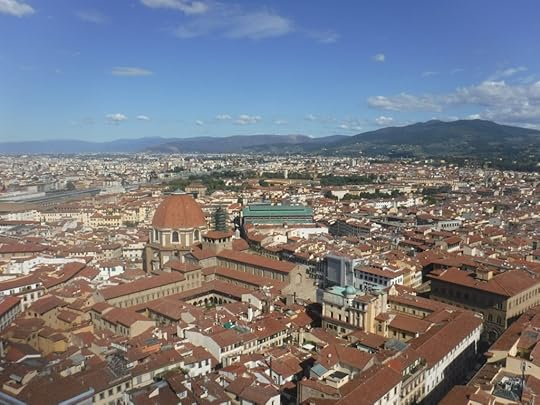
My reservation at the Uffizi gallery wasn’t until 1:45, so I had quite a bit of time to kill. I wandered down across the Ponte Vecchio to the Piazza di Michaelangelo, then stopped for lunch at a local spot and enjoyed beer and a cheese platter.
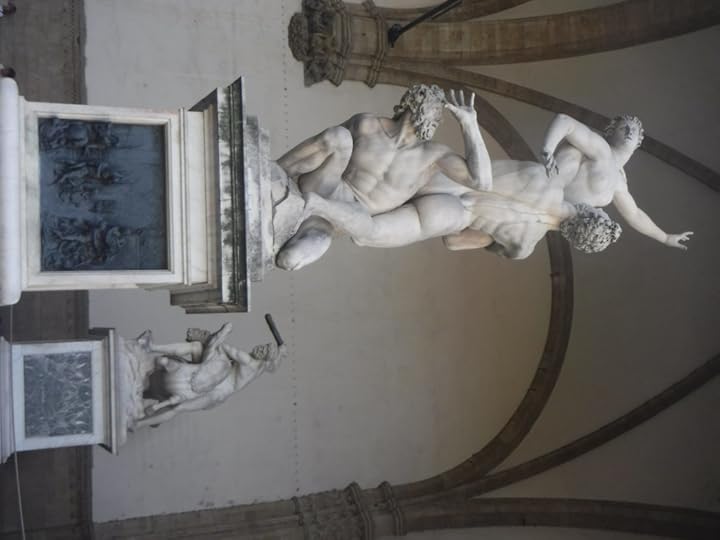
Outdoor statue exhibit near the Uffizi
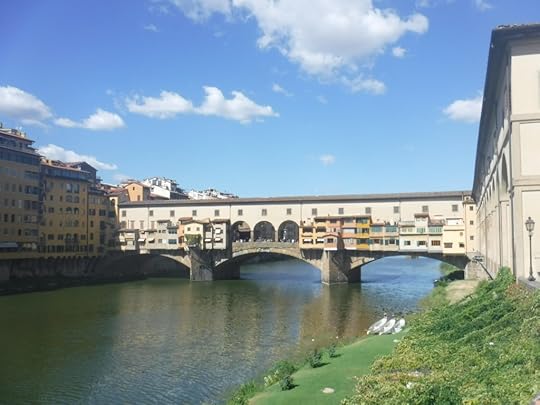
Ponte Vecchio
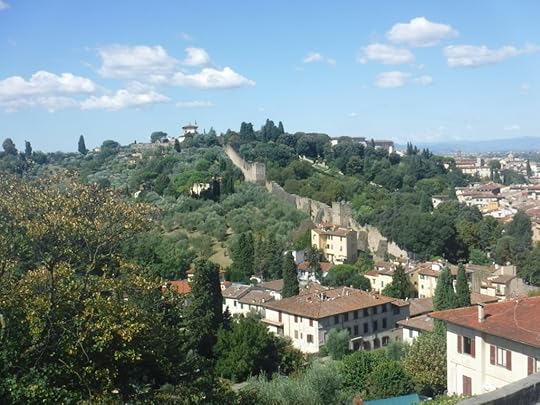
View of an old fortification from the piazza
Then it was on to the Uffizi. What can I say about one of the world’s most famous art museums? Paintings by renaissance masters mingle with Roman sculptures and Greek tombs, often in the same room. The rooms are not arranged by time period, but rather in an artistic manner to give a sense of theme. It’s definitely worth the visit, as well as the reservation to skip the long line. Rather than describe the Uffizi room by room, I’ll include the highlights here:

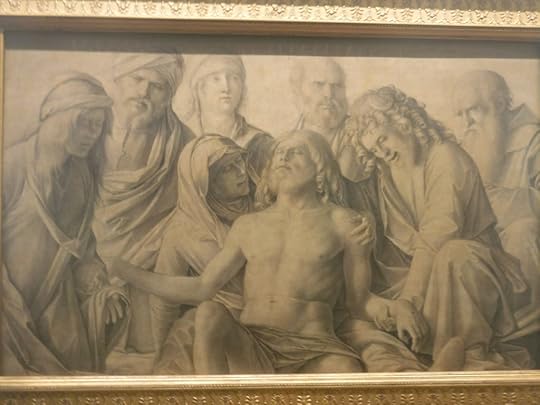



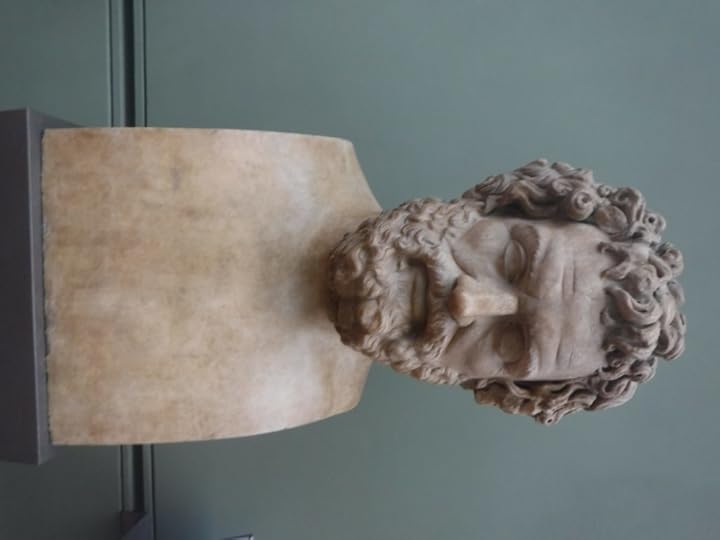
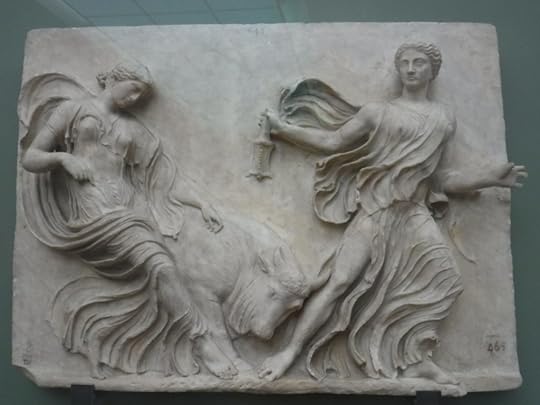


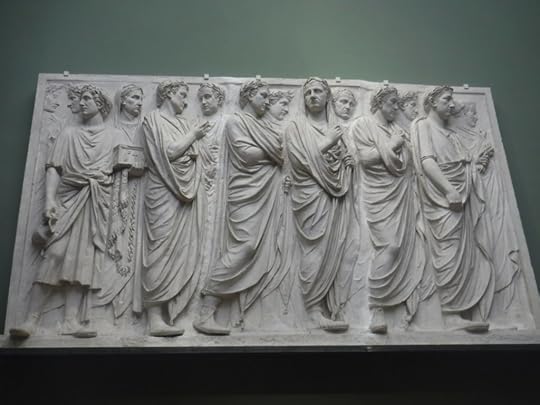

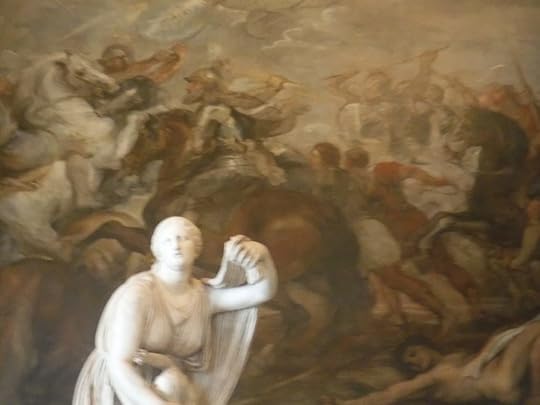
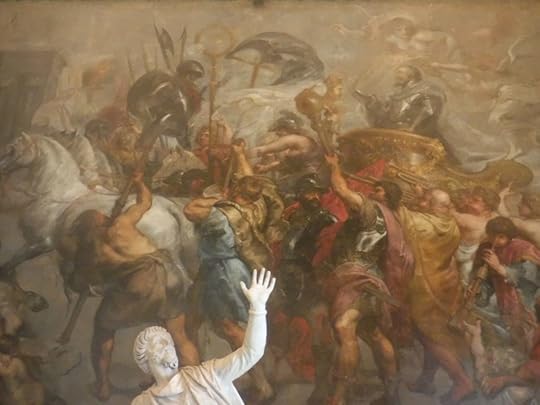
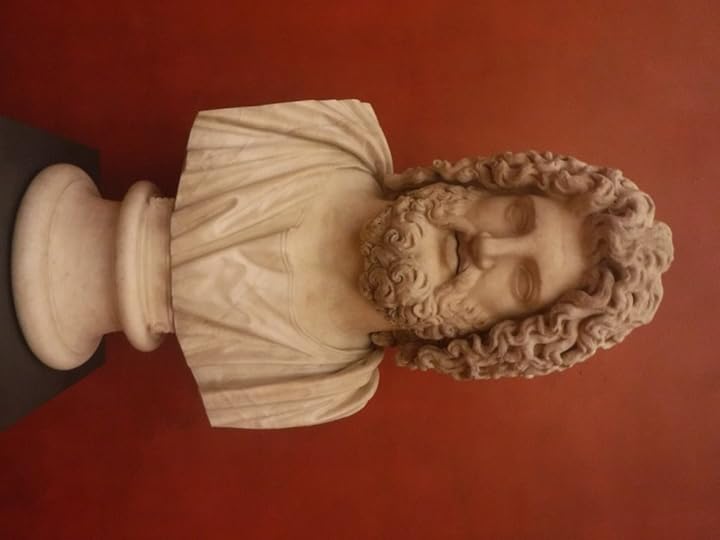

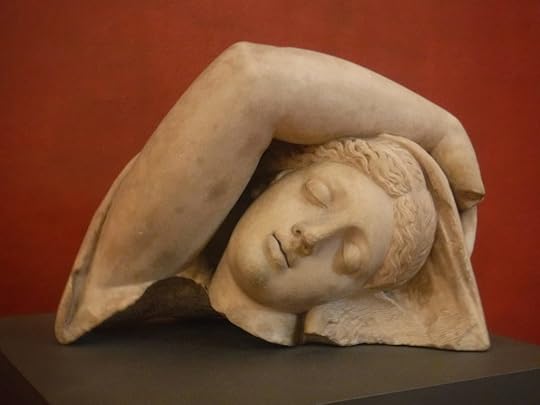
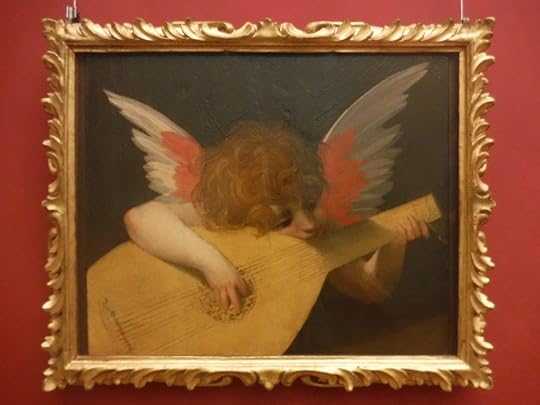
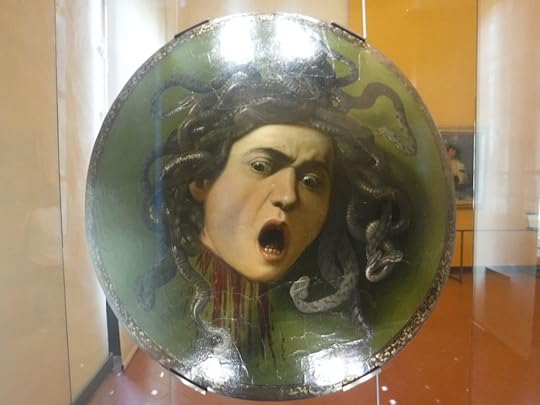

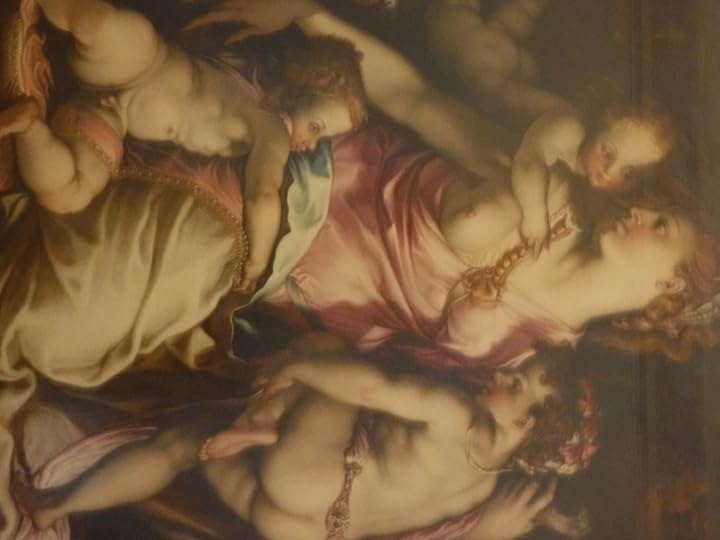

I spent the evening enjoying Chianti, Florentine steak, and the writing more of the rough beginnings of Crystal Empire (6 Chapters done!). It was a perfect way to complete my introduction to Europe.
My top recommendations for an amazing European vacation: Prague, Central Slovakia, Tuscany.
This concludes the travel blog until my next adventure (Germany 2017 with Aimee and friends). I now return to work, editing, and numerous other writing projects. Stay tuned for more Doom’s Daughter in the upcoming weeks, as well as news on the publication of Crystal Secrets!
September 7, 2016
The Tuscany Tour
Since I stayed longer in Florence, I’ll talk about the Tuscan countryside first.
I joined a tour with my coworker, Alycia, since we were both going to be in Florence at the same time. She had already booked the tickets with her husband and another couple, but said I was welcome to come along, and I’m glad that I did. Tuscany was easily one of the highlights of the trip.
All in all, we spent twelve hours on the tour including travel time by bus, but it was time incredibly well-spent. The itinerary included four stops: the castle-village of Monteriggioni, the rival city of the Florentines known as Siena, the amazingly well-preserved medieval town of San Gimignano, and a wine tasting at the Palagetto vineyard.
Our first stop, Monteriggioni, was an adorable little village set within the walls of a well-preserved castle fortification. Here I discovered authentic artisan shops, not the kitschy tourist stuff you find in the big cities, and some amazing views of the countryside (though every stop had that, to be honest — all the cities are nestled nicely in the hills of Tuscany). I splurged on a nice bottle of wine for Aimee, purchased from an 800-year-old cellar. This signature vintage has a limited bottling of 6000 per year. Hopefully she lets me have a glass!

Siena included a historical walking tour. The city is well-known for its annual horse race in the main square to celebrate the Madonna saving them from the plague in the 15th century. More impressive, however, was the church, which took over five hundred years to construct and was intended to be the most impressive cathedral in the entire world. The craftsmanship was exquisite, and I can easily say that it was the most awe-inspiring place of worship that I have seen yet on my tour. From the stained-glass windows to the paintings by renaissance masters to the engraved floors, everything was breathtaking.


We stopped in Siena for a large and cheap lunch before taking the bus to San Gimignano, another fortress-city in the Tuscan hills. This town was packed with people, but we were treated to more incredible views and a free gelato from a famous local spot. There are lots of handmade crafts and if you deviate from the main street you can find some quiet places to take great photos. San Gimignano had some cool museums which I didn’t have time for, so I’ve bookmarked the town as a place to return to and delve into some local history.

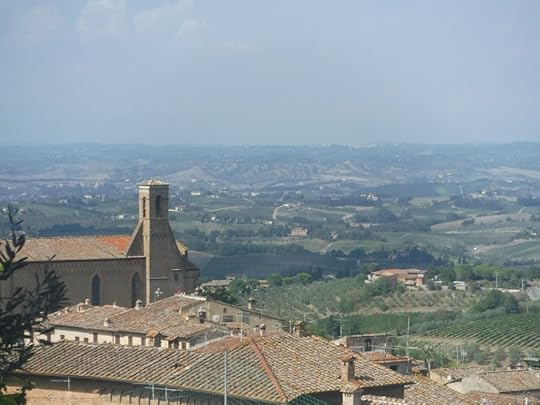
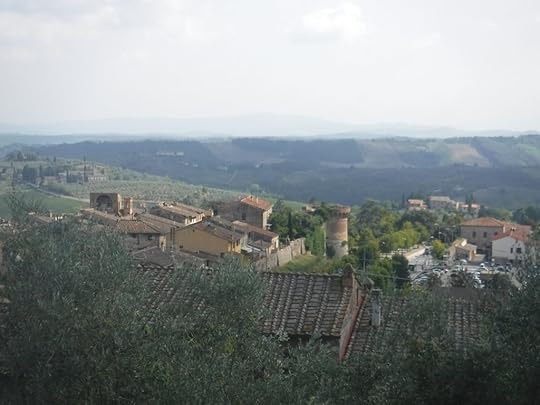
Our final stop was the wine tasting, and although I was only planning on buying one bottle, a full tasting convinced me to buy two. The Palagetto vineyard is known for is Vernaccia di San Gimignano grape, as well as its excellent (and ridiculously affordable) Chiantis.
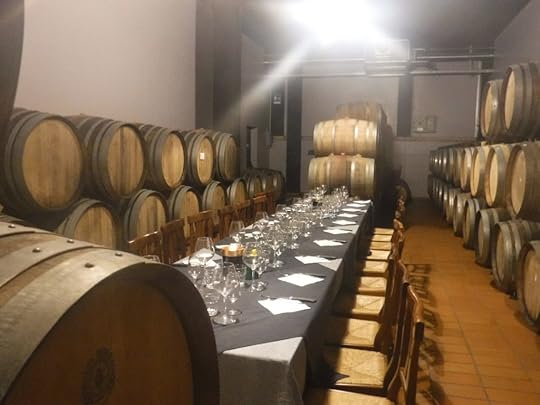
From my brief taste of the region, I think you could spend a month in Tuscany and still want more. More wine, more mind-blowing food, more unique artisan shops, more medieval flavour, more panoramic views, more gelato. Venice is magical, Rome is inspirational, and the Cinque Terre is beautiful, but Tuscany felt like the heart of Italy to me.
September 6, 2016
Two Out of Five Ain’t Bad
Regrets, I’ve had a few. But then again, too few to mention.
If I had known about the Cinque Terre sooner (instead of booking a day last-minute), I would have opted to spend a lot more time there. However, I saw it as an opportunity to “scout” for myself and Aimee, and others potentially thinking of going to Italy (Mum and Dad, Aunt Sue, hint, hint).
The Cinque Terre are a series of five brightly-painted cliffside medieval towns carved into Italy’s coast just north of Pisa and La Spezia. Many of them still have fortifications from the days when they had to protect themselves from coastal raids. Now they are resort towns, full of tourists, restaurants, artisan shops and beaches (most of them rocky but the water is blessedly cool in the summer heat).
Expect to walk a lot in the Cinque Terre, and not just back and forth — I mean up and down, too. They are villages built into the coastal rocks, so it’s ramps, stairs and slopes wherever you go. It’s easy to justify getting two gelatos a day there. You’ll work it off (and you need them in the summer heat).
I didn’t get a chance to do the hikes between the villages due to time restrictions, but as I understand it, the views are amazing (if you can brave the extreme hikes between some of them — the ‘easier’ walks between the first three villages are under repair due to flooding a few years back). If you don’t feel like hiking, the regional trains run regularly and the time between towns is only a few minutes.
My experience with this little slice of Italian paradise was thus: coming from Rome, I transferred trains in La Spezia and stopped in Riomaggiore, the southeastermost (not a word, I know) for the evening, watching for pickpockets around the train station (a few sketchy people around, but just be alert, not staring at your phone, and you should be fine…from what I’ve been told they target zombie tourists).
Riomaggiore is a cute little hilly number built into the cliffs, and getting to my hostel was quite a climb, both on the street and within the hostel itself (buildings are tall and super thin). I dined on an amazing regional dish of stuffed anchovies (picture included) and people-watched, then got adopted by a local group of young, rowdy Italians who had just come back from the El Camino trail. They taught me bad Italian words until I waved farewell and went to bed.
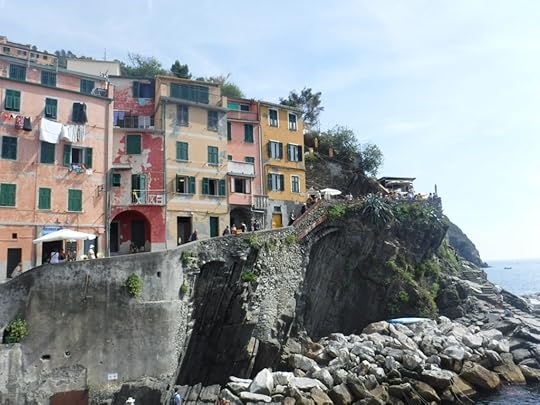
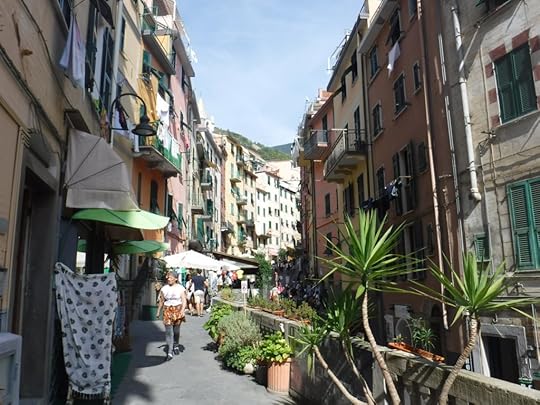
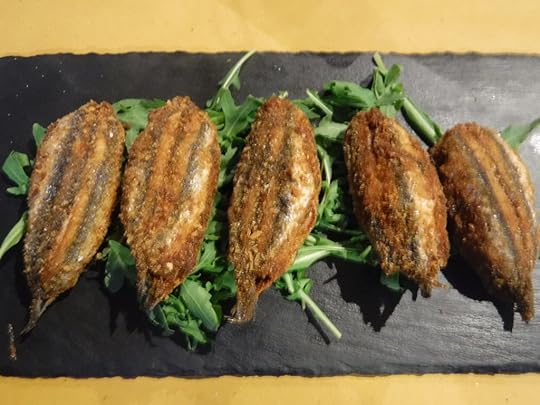
Vernazza, the fourth town, is said to be the most picturesque, so I took the train there in the morning to snap some photos and grab a piece of foccacia for breakfast. This beach was a bit nicer, but I could see across the water to Monterosso al Mare, the final town, which has a sandy beach and is the most popular swimming spot.

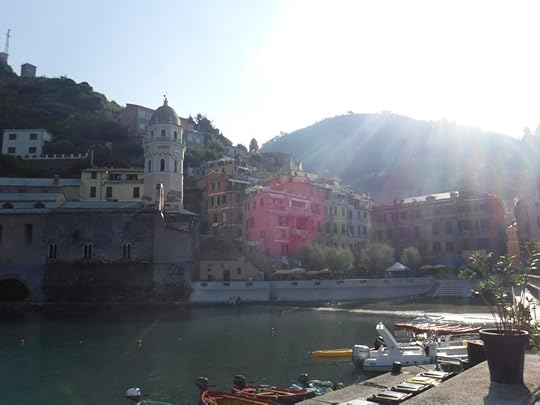
All in all, if I’d had more time I would have stayed an extra day or two to get some hikes, swimming and history in, but I’m glad I got a chance to look and see the Cinque Terre, if only for a brief time. Expect a lot of tourists if you go, but there’s a reason it’s popular. It set my imagination ablaze for the Crystal series.



